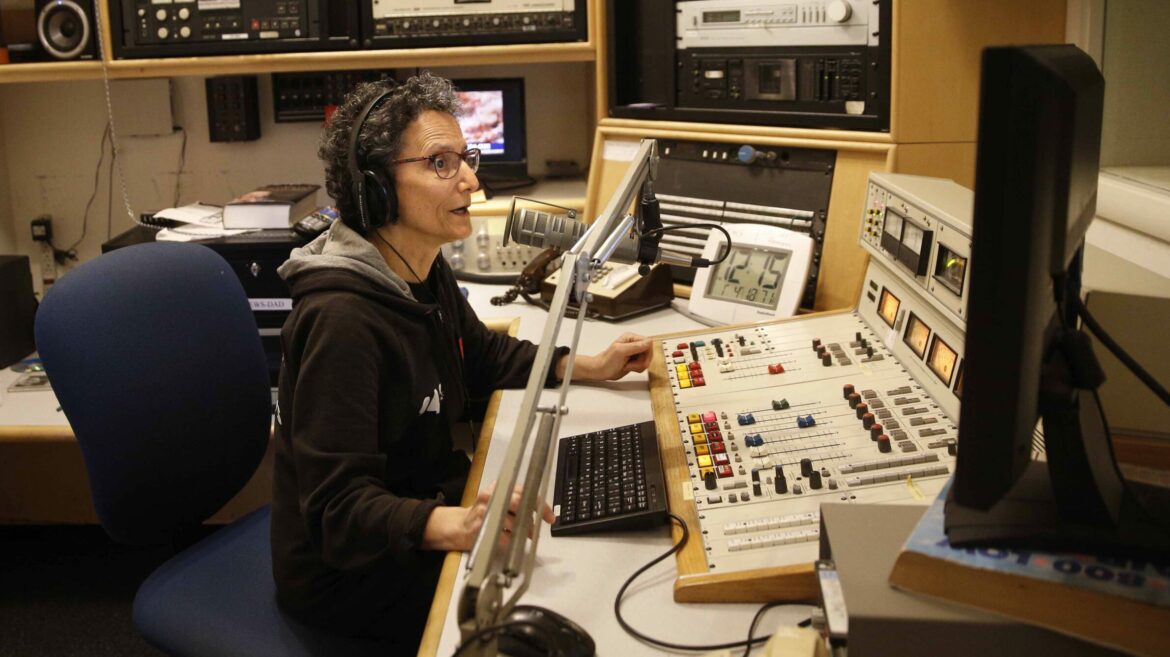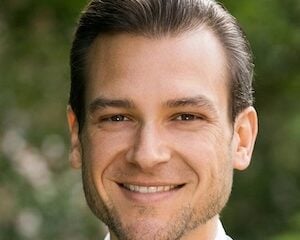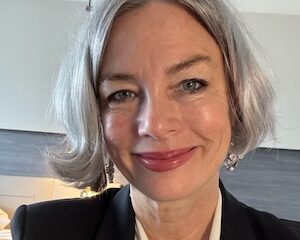Aileen Alfandary, tenacious ‘force multiplier’ for journalism, retires

San Francisco Chronicle/Hearst Newspapers / Getty Images
Aileen Alfandary, co-director of news, in the KPFA studio in Berkeley, Calif., in January 2018.
As Aileen Alfandary prepares to retire from the newsroom where she has worked and trained legions of journalists for nearly 48 years, she insists that she’ll continue to be heard on Pacifica’s KPFA in Berkeley, Calif.
Alfandary, 68, plans to file stories for the evening newscast after she retires Thursday.
“It has always felt like a privilege to be able to go to work and do something that I believe in,” Alfandary told Current. “I’ve always loved the work.”
Alfandary is a thin woman whose physical stature belies her no-nonsense demeanor. Matthew Lasar, a KPFA volunteer for close to 20 years and author of Uneasy Listening: Pacifica Radio’s Civil War, said he experienced Alfandary as “the secret guardian-protector of KPFA, who … relentlessly stood in the doorway against the endless stream of demagogues, nuts and self-appointed experts who wanted to turn the station into their own personal sandbox. … I still remember that tool steel look she would get in her eye.”
Alfandary began her nearly half-century association with KPFA as an undergraduate at the University of California, Berkeley. She received academic credit for volunteering at the listener-sponsored radio station in 1975. When the semester was up, she continued to volunteer.
Alfandary worked briefly as an engineer at Internews, a short-lived Bay Area radio collective whose foreign news reports aired on Pacifica and its affiliates from 1973 to 1978. The collective’s members included Elizabeth Farnsworth, who later became a correspondent and fill-in host for PBS Newshour, and documentary producer Stephen Talbot, whose films for PBS have aired on Frontline, Independent Lens and American Experience.
Talbot remembers Alfandary as “extremely hard-working and smart as a whip.”
‘She had … amazing tenacity’
After Internews folded, Alfandary was hired as a news anchor at KPFA, starting shortly after the Three Mile Island nuclear accident in March 1979.
“Probably the best thing I did at KPFA was hiring Aileen,” said Alan Snitow, a producer of TV documentaries who was KPFA’s news director at the time.
Snitow tried unsuccessfully to create a national newscast for Pacifica when he was running KPFA’s newsroom. He described the job as “a killer in many respects.”
“There was a lot of envy, distrust and very divisive politics at the station and the network. The things that went on at KPFA could be extremely distracting,” he said. “Aileen was really able to ignore a lot of that kind of stuff and maintain her equilibrium through it all. She had a certain toughness and focus, a kind of amazing tenacity.”
The recurring turmoil at KPFA and within Pacifica has been more than distracting as far as Alfandary is concerned. For many years she has held the view that “financial mismanagement and governance dysfunction” of the Pacifica National Board threatens to sink KPFA along with the entire network. Alfandary became an advocate of KPFA severing its ties to Pacifica. Her views about this have hardened as Pacifica’s financial condition deteriorated. In 2022, a lien was briefly placed on KPFA’s building. It was lifted last December when U.S. marshals seized more than $300,000 in KPFA’s cash reserves to satisfy a defamation judgment against WBAI.
“My hope for KPFA is that we break free of Pacifica and become independent. I think that’s KPFA’s only livable path to the future,” Alfandary told Current.
Alfandary has lent her name and support to the Pacifica Safety Net and its subsidiary, the KPFA Safety Net, which advocates independence for the Berkeley station and is supported by listeners and KPFA board members.
Pacifica Safety Net has raised $11,000 on GoFundMe, which will support efforts to keep the station alive, including legal challenges, according to Sherry Gendelman, president. Although Alfandary doesn’t have any current plans to be actively involved with the group, she said she wouldn’t rule it out.
‘Our job isn’t just doing news’
When Snitow was KPFA news director, the station’s union contract stipulated that all employees were paid $600 a month. The union included unpaid staff who were covered by its work rules and held rights to participate in station governance. At one point in his tenure there were 30 people, most of them volunteers, in the news department, Snitow said.
Alfandary became news director after Snitow resigned in June 1981. Later that year Mark Mericle left his job as GM of WYSO in Yellow Springs, Ohio, to work at KPFA as a news anchor. Within a year, Alfandary offered Mericle the title of co-director of the news department, a title they both hold to this day.
“Here at KPFA we have always put an emphasis on covering activist movements, elevating those movements and understanding the importance they play.”
Aileen Alfandary
Mericle doubts that he would have lasted so long in the job “without having someone like Aileen to work with,” he said. At 76, he has no immediate plans to retire.
“Our job isn’t just doing the news, it’s preserving the institution that allows this kind of news broadcasting to occur,” Mericle said. “Over the years it has become rather tiresome, having to not only do a very difficult job but continue to fight for the right to do a very difficult job.”
Alfandary estimates that she and Mericle have trained close to a thousand reporters over 40 years. KPFA’s emphasis on training meant that its newsroom became a place where ambitious young journalists could get on the air fairly quickly.
“It’s rejuvenating to have this constant flow of young people who really want to learn how to be journalists coming in and getting the opportunity,” Alfandary said. “It’s important for the new reporters that we train to understand that this is a mission-driven organization,” the mission being Pacifica’s 75-year focus on peace and justice.
“Here at KPFA we have always put an emphasis on covering activist movements, elevating those movements and understanding the importance they play, even though the mainstream media, the politicians, will forever downplay their importance,” she said.
Commitment to KPFA and its community
Aaron Glantz is one of many distinguished journalists who began his career at KPFA. An investigative reporter and editor who worked for Reveal and the California Newsroom created by NPR and member stations in the state, he got his start covering the state capital in Sacramento for KPFA. “The most important thing I learned from Aileen was that fairness, thoroughness and integrity are not at odds with journalism’s mission to comfort the afflicted and afflict the comfortable. They are, in fact, linked,” Glantz said.
“There’s no doubt that generations of talented journalists have gotten their start learning directly from Aileen. She’s really been a force multiplier of the entire profession.” Glantz now works as capital bureau chief and senior editor for the Fuller Project, a global news organization focused on investigative coverage that improves the lives of women.
Other KPFA alumni who went on to become high profile reporters and producers include Mara Liasson, NPR’s national political correspondent; Bari Scott, EP of The DNA Files science series; and Laurie Garrett, a Pulitzer-Prize winning journalist and former NPR science reporter. During her time at KPFA, Garrett recalled that she and Alfandary endured “utter chaos” at the station.
“Aileen pushed on, harvested the news and put together a show,” Garrett wrote.
KPFA and other Pacifica stations also provided training to station managers who moved on to NPR or its member stations. Jo Anne Wallace was GM of KPFA before she accepted the same job at KQED-FM in 1990, a few years after the station dropped classical music and went all-news. Until then, KPFA was pretty much the only radio station in the Bay Area that broadcast serious local news.

“A lot of the audience that we might’ve once had migrated to KQED over time,” Alfandary concedes. Yet she was never tempted to leave Pacifica for a career at NPR or one of its member stations. Her commitment to providing a decidedly left alternative to NPR’s journalism is shared by Mericle, her colleague of more than 40 years, who describes himself as a democratic socialist.
“It doesn’t surprise me that she stayed,” said Richard Buster Gonzales, who worked in KPFA’s public affairs department and did stories for the newscast before being hired by the NPR foreign desk in 1986. “It really goes to her commitment to the station and the community. She took that very seriously. Who has commitment like that anymore?”
In July 1999, KPFA was at the center of another Pacifica crisis. Alfandary and Mericle were among dozens arrested when protests erupted over Pacifica’s decision to fire KPFA GM Nicole Sawaya. The street outside KPFA’s building was filled with 10,000 listeners in what was described at the time as the largest demonstration in Berkeley since the Vietnam War. Alfandary said she disobeyed an order from Pacifica’s executive director not to cover Sawaya’s dismissal on the KPFA newscast. (Sawaya, who passed away in 2018, went on to become GM at KALW in San Francisco and later served briefly as Pacifica’s executive director.)
‘She made it happen’
At the time of the 1999 crisis, Afandary was coping with a major challenge in her personal life. Her first child, David, had been born with cerebral palsy and other developmental disabilities. She spent several years creating an innovative group home in Berkeley for youth with significant developmental disabilities. The BuILD House opened in 2002 and now its residents are adults.
Ailene Romero, a member of BuILD’s board, said Alfandary played a pivotal role in raising funds and garnering community support for the home. “She made it happen,” said Romero.
Alfandary’s son lived in the group home until he passed away in 2012 at age of 25.
“I so appreciate what she did with her challenges and her resources,” said Kris Welch, host of a live KPFA show called The Talkies. Welch, 80, still cares for her daughter who was born with cerebral palsy. “Aileen built that house and it’s still functioning and benefitting the disabled community.”
Alfandary’s son Marco followed a different path to build a career in media. Marco Alfandary has worked at ESPN since 2011, where he currently produces the midnight edition of SportsCenter. His mother’s work ethic, he said, has had a big impact on him.
“People sometimes say that he followed in my footsteps, but I point out that he works for Disney and I work for Pacifica,” his mother quipped.
Welch, who has been doing a live radio show on KPFA for 51 years, recently hosted an on-air tribute to Alfandary. When Alfandary said she will return to her “volunteer roots” and continue reporting for the station in her retirement, Welch expressed relief.
During an upcoming trip abroad, Alfandry plans to gather sound for a story on the legacy of fascism in Spain.






